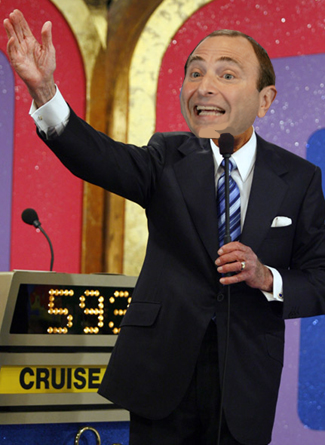
The NHL has released the details of their proposal to the NHLPA today. It clears up a few misconceptions of what people were writing/tweeting/saying yesterday and we're going to look at each one piece by piece.
1. Term:
• Six-year Agreement with mutual option for a seventh year.
2. HRR Accounting:
• Current HRR Accounting subject to mutual clarification of existing interpretations and settlements.
This is a big one right now because no one really know what the Hockey Related Revenue (HRR) are going to be. Are they going to be the same as last season or are they going to be different? That could hold up any accepted deal by the NHLPA, because the 50/50 split is going to come from this.
3. Applicable Players' Share:
• For each of the six (6) years of the CBA (and any additional one-year option) the Players' Share shall be Fifty (50) percent of Actual HRR.
And that's where a definition of what the HRR is going to consist of would help. No one truly knows what the proposed HRR will be compared to what it was in the last CBA. A 7% paycut (the players were receiving 57% of HRR in the last CBA) may not sound like much, but if HRR is lower than it was in the last CBA then the players could be taking a larger paycut.
Whatever happens, the owners are going to get an increase in revenue. They were only getting 43% of the cut, so a 7% increase on any number is going to be a win for them. The rich get richer, ya know?
6. System Changes:
• Entry Level System commitment will be limited to two (2) years (covering two full seasons) for all Players who sign their first SPC between the ages of 18 and 24 (i.e., where the first year of the SPC only covers a partial season, SPC must be for three (3) years).
• Maintenance of existing Salary Arbitration System subject to: (i) total mutuality of rights with regard to election as between Player and Club, and (ii) eligibility for election moved to five years of professional experience (from the current four years).
• Group 3 UFA eligibility for Players who are 28 or who have eight (8) Accrued Seasons (continues to allow for early UFA eligibility — age 26).
• Maximum contract length of five (5) years.
• Limit on year-to-year salary variability on multi-year SPCs — i.e., maximum increase or decrease in total compensation (salary and bonuses) year-over-year limited to 5% of the value of the first year of the contract. (For example, if a Player earns $10 million in total compensation in Year 1 of his SPC, his compensation (salary and bonuses) cannot increase or decrease by more than $500,000 in any subsequent year of his SPC.)
• Re-Entry waivers will be eliminated, consistent with the Cap Accounting proposal relating to the treatment of Players on NHL SPCs playing in another professional league.
• NHL Clubs who draft European Players obtain four (4) years of exclusive negotiating rights following selection in the Draft. If the four-year period expires, Player will be eligible to enter the League as a Free Agent and will not be subject to re-entering the Draft.
Entry Level contracts will go from 3 years down to 2 years, which is actually pretty good. Yesterday it was said that Entry Level Contracts would move up to 4 years, which didn't make much sense on the players side of things. It also seems that arbitration will remain the same.
One of the biggest issues about yesterday's proposal was that a player would have to be 28 years old and have 8 years of NHL service. This is clearly wrong as the proposal states 28 years old or 8 years of service, which means the youngest a player could be to hit free agency is 26. Think about that for a minute. A team could have someone like Tyler Seguin until he was at least 26 years old.
Maximum length on contracts is 5 years where now there isn't a cap on the number of years a player could get. This could allow for more parity throughout the league with players changing teams every five years or so and it also limits the amount of ridiculous long-term contracts that have been handed out like candy.
9. No "Rollback":
• The NHL is not proposing that current SPCs be reduced, re-written or rolled back. Instead, the NHL's proposal retains all current Players' SPCs at their current face value for the duration of their terms, subject to the operation of the escrow mechanism in the same manner as it worked under the expired CBA.
Also a good thing. The players (if they can get an 82-game schedule in starting November 2nd) will get their full pay with no rollback.
What do you think of the deal?
Add The Sports Daily to your Google News Feed!